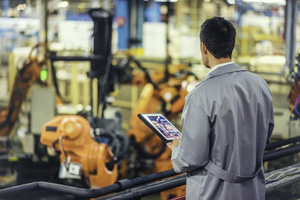
 |
Charlotte Stonestreet
Managing Editor |
| Home> | AUTOMATION | >Systems | >It’s all about digitalisation |
It’s all about digitalisation
05 July 2022
At the recent Manufacturing Expo Charlotte Stonestreet caught up with Simon Meadmore, vice president product and supplier management at Farnell, to find out about how the company is strengthening its industrial automation presence

CHARLOTTE STONESTREET: What message is Farnell highlighting at Manufacturing Expo?
SIMON MEADMORE: This is a really important show for us. It’s the first time we’ve been to this event and we wanted to take the opportunity to push our industrial proposition, specifically industrial automation. This a space where we feel we can penetrate and grow our business. A lot of our customers don’t specifically know us for that. They know us for the board-level components, things such as passives, connectors, and the like, and we just wanted to take the opportunity to push industrial. We’ve got two of our key partners here - Omega and Festo. Festo are focussed on the hydraulics and valves and Omega on industrial sensing,
So industrial is a developing category for us and, yes, it is proving successful – and I think we’ve managed to get that message across to our customer base.
We also want to move away from just promoting individual products, to looking at how can we offer a complete solution to the customer; we want to be that broad one-stop-shop offering everything from a diode to a ceramic capacitor, through connectivity solutions, to industrial space pneumatics and sensing, right up to complex testing and measurement – all without neglecting our overall proposition!
CS: What sort of provision does Farnell provide in terms of engineering support?SM: That comes via our technical support team, one of whom is here with us at the event today. They are available online, or customers can pick up the phone and speak to them. They are ‘generalists’, so if they can’t answer a question, we will refer it back to our supplier partners.
CS: How have the recent supply chain issues impacted Farnell’s business?
SM: Of course, we are not immune to supply shortages, but we carried out some pro-active buying activity during the pandemic, so we’ve increased our order books and inventory is now flowing in. We appeal to our suppliers, who know that we are not just serving contracts, we’re dealing with engineers and they can help by ensuring that we have, for example that specific reel, pack or a tube of a product available. We are working really hard to ensure he have the supply line to bring products to the shelf.
CS: How are you seeing your customer’s requirements changing?
It’s all about digitalisation. We are spending a lot of time making sure that we have the right content on our site. It’s not just about showing the product – we’ve got the application notes, the data sheets, the video content. Not only do customers want to buy in one place, they want all the right content to help in their decision making.
So our strategy is digital first. It’s the key pillar of our strategy, we’ve put investment into our e-commerce capabilities, and around 80% of the business we do in Europe is now online. However, we still want to maintain the external sales teams, and certainly during the pandemic it was really important that customers could get on the phone and speak to someone. For example, during that time we were supporting the medical sector which was experiencing a huge growth in demand.
CS: Talking of sectors, are there any that are particularly strong for Farnell at the moment?
SM: Yes, wider industry and industrial automation. We are also seeing the whole electric vehicle infrastructure growing in importance, and the aerospace sector. As a result of the war in Ukraine, governments' spending in this area has increased and we are starting to see that come through – it’s something that we are hearing from our suppliers too.
Traditionally Farnell has had one of its strongest customer bases in contract electronics manufacturers, with on-board components like semiconductors, connectors, LEDs, that type of product. We are now building our industrial customer base, including OEMs, and we see this as a complementary strategy.
CS: Are you seeing any re-shoring trends amongst your customer base?
SM: I hear about it, but I don’t know if you could really call it a trend. The issues is that there’s so much uncertainty; for example, if you take into account rising energy costs, where is the best place to put your manufacturing? Over in the US we’ve seen billions being invested to boost wafer manufacturing capacities. I think in the UK we’ve got a strong manufacturing base already and, yes, some restoring may be going on – at Farnell we just need to make sure that we can support those manufacturers and we are doing that by investing in a new distribution centre and adding millions to the inventory. We will always support UK manufacturing, whatever path it takes.
CS: Does Farnell feedback information about product requirements and trends from customers to suppliers?
SM: Yes, we use the Element 14 platform for that. It’s basically like Facebook for engineers, where they came come together online as a community and collaborate to talk about new ideas, concepts and technology. What we have found is that suppliers now use that as really important route to market.
Historically we used website banners and emails, and while we still do that, we now use different strategies as well. For example in some cases Farnell will provide known engineers from the Element 14 community with a particular product from a supplier and the engineers will then test the product and provide detailed feedback about the performance of that product via the community.
On our transactional websites, customers can rate the products and give feedback, although that method is a bit less popular. I think the community aspect is really important – and we’ve got more than 800,000 members of Element 14 now. Suppliers can use it to take products to market and get realtime feedback from engineers. It’s an invaluable resource.
CS: Can the Farnell offering help businesses overcome the engineering skills crisis?
SM: Through single board computing, we are definitely entering the education space as it’s all about helping young engineers code products. We work with universities throughout the UK as well. It’s about getting the Farnell name in front of engineers so they know we are an easy to use e-commerce platform. If they have requirements for their prototype product they can come and talk to Farnell. I think the latest generation of engineers wants to find everything they need in one platform, not just a product, but all of the extra content and we are supporting them by providing that.
We’ve had lots of students on the stand over last couple days, which has been really good. They don’t necessarily know who Farnell are, so we can explain what the proposition is. This is the next generation of customers for us; we used to be able to give them the catalogue, but now it’s all about our e-commerce platform and hopefully they can relate to that.
CS: What further challenges do you see in the near future for the industrial sector?
SM: I think the invasion in Ukraine could impact raw materials – nickel, neon, there’s any number of things produced in that region and really, the full impact is yet to be known.
In general it does depend on what type of product you are look at, what specific technology, but demand seems strong still. There is some restriction due to semi-conductor availability, but I think that with the growth we are seeing in automation, the outlook is still very positive, certainly from a Farnell perspective and from the clients that we speak to, and this road will continue.
- Keep on running
- Campaign to save bees
- Security challenges & opportunities for manufacturing
- Farnell expands range of switches
- Arduino UNO R4 available from Farnell
- Survey shows willingness to deploy AI
- Farnell broadens industrial product portfolio
- Education discount programme
- Simple & reliable USB connectivity
- Latest products from TE Connectivity available from Farnell
- SWISSLOG SECURES MAJOR ORDER
- IMPROVED PERFORMANCE & RELIABILITY
- Engine Facility
- BULK AUTOMATION
- Integrated Packaging Solutions
- INTEGRATING ELECTRIC AND PNEUMATIC CONTROLS
- Rockwell Automation expands Midrange system portfolio
- Yokogawa joins Friends of the Supergrid
- Festo extends reach of VTUG and MPA-L valve terminals
- Siemens extends TIA Portal engineering framework




















